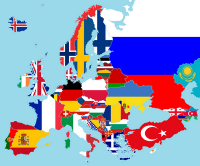-
State Department holds competition for social media apps challenging terrorism
Can the obsession millennials have with smart technology be capitalized on as a weapon against terrorist propaganda? The U.S. Department of State thinks so, and has selected three teams of student finalists — chosen from fifty-six universities around the world — to its headquarters in Washington, D.C., next week for the “Peer-to-Peer: Challenging Extremism challenge.”
-
-
Tracking, analyzing how ISIS recruits through social media

A team of researchers has developed a model to identify behavioral patterns among serious online groups of ISIS supporters that could provide cyber police and other anti-terror watchdogs a roadmap to their activity and indicators when conditions are ripe for the onset of real-world attacks. The researchers apply the laws of physics to study how terrorist support groups grow online, and how law enforcement can track activities.
-
-
Social media used to assess damage caused by natural disasters
A new study concludes that it is possible to determine the damage caused by a natural disaster in just a few hours by using data from social networks. “Twitter, the social network which we have analyzed, is useful for the management, real-time monitoring and even prediction of the economic impact that disasters like Hurricane Sandy can have,” says one of the researchers.
-
-
Pro-ISIS hackers issue threats to Facebook, Twitter founders
Pro-ISIS hackers have released a video threatening the founders of Facebook and Twitter in retaliation for the two social media giants’ campaign to take down ISIS-related accounts. The threat was issued in a 25-minute video, uploaded on Tuesday to social networks by a group calling itself “Sons Caliphate Army” – which experts say is the latest “rebrand” of ISIS’s supporters online.
-
-
ISIS should be kicked off the open Web: Google official
Jared Cohen, director at Google Ideas and an advisor to the heads of parent company Alphabet Google, said ISIS should be kicked off the open Web. He noted that the Islamist group is always going to be in a position to use some aspects of the Internet, such as anonymized browsing through Tor and the uncatalogued dark Web, but it should be chased away from the open Web.
-
-
Young women’s warning to other women: Don’t be fooled by ISIS
A young woman who converted to Islam after being drawn to ISIS on social media has publicly warned other girls about how the jihadist group uses social media to reach vulnerable individuals such as herself. Her mother called the national hotline and the French police was able to intervene before the two women left for Syria. The young woman has since joined other youngest girls in France’s deradicalization program.
-
-
Mining social media improves disaster response efforts

Leveraging publicly available social media posts could help disaster response agencies quickly identify impacted areas in need of assistance, according to a team of researchers. By analyzing the September 2013 Colorado floods, researchers showed that a combination of remote sensing, Twitter and Flickr data could be used to identify flooded areas.
-
-
Family of ISIS victim sues Twitter for enabling terrorism
The family of Lloyd “Carl” Fields Jr., who was killed last year in an attack in Amman, the capital of Jordan in an ISIS shooting, is suing Twitter, claiming the network has not done enough about the spread of the group’s deadly reach. The complaint claims that the shooting might never have happened had Twitter not existed.
-
-
U.S. officials barred from reviewing social media postings of visa applicants
Officials from DHS and the Department of State, as a general policy, do not check social media postings of applicants out of civil liberties concerns. With this policy in place, the department’s officials who handled Tashfeen Malik’s application could not have seen her pro-ISIS postings and note her growing radicalization. Officials from United States Citizenship and Immigration Services (USCIS) and U.S. Immigration and Customs Enforcement (ICE) pressed for a change in DHS policy in light of the fact that social media is increasingly used by followers of jihadist groups to declare their allegiance, but the disclosures by Edward Snowden about NSA surveillance programs was behind the reluctance of DHS high officials to change the policy for fears such a change would further damage the administration’s standing with civil rights groups and European allies.
-
-
EU Internet Forum launched to fight radicalization, terrorist content online

The EU earlier this week launched the EU Internet Forum. The aim of the forum is to bring together EU interior ministers, high-level representatives of major Internet companies, Europol, the EU counterterrorism coordinator, and the European Parliament. The EU says that the goal is to reach a joint, voluntary approach based on a public-private partnership to detect and address harmful material online.
-
-
N.Y. State Police app helps citizens report suspicious activity
The New York State Police is urging citizens to download a new digital app which allows citizens to capture and report suspicious activity with their smart phones. The app is part of the “See Something, Send Something” campaign which aims to turn willing citizens into the eyes and ears of law enforcement. For example, if a citizen notices an unattended package at a train station of an airport, they could use the app to alert law enforcement.
-
-
Searching for malware hidden in shortened URLs on Twitter

Cyber-criminals are taking advantage of real-world events with high volumes of traffic on Twitter in order to post links to websites which contain malware. To combat the threat, computer scientists have created an intelligent system to identify malicious links disguised in shortened URLs on Twitter. They will test the system in the European Football Championships next summer.
-
-
Extremist groups use social media to lure recruits, find support
In the past, extremist groups have used tools and forums which were available: Rallies, pamphleteering, and marching in parades were the primary means used for recruitment and spreading their message. Now, as is the case with many other individuals and groups, these efforts have adapted to more contemporary media to target college and university campuses, to gain new members or, at least, sympathy to their cause. They now use the Internet to conduct forums and publish newsletters, a method that exposes potentially millions to their message.
-
-
Countering extremist groups’ social media influence, persuasion
Social media has become a vital channel for terrorist groups to share news and seduce new members. The recent, notable successes of ISIS in the United States and Europe have demonstrated that terror groups can successfully use this approach to further their agenda of violence. While it gets less attention, social media is equally important for groups that are sharing and communicating information to counter extremist discourse. The problem is, how can those looking to counter the violent ideology of groups like ISIS analyze all the conversations to determine what is a significant danger? How can groups countering violent extremism leverage social media to limit the diffusion of extremist ideology? New research aimed at helping to solve this puzzle.
-
-
Disinformation campaigns damage credibility of social media emergency alerts
Disinformation campaigns, which populate sections of social media platforms such as Twitter, are making real emergency data and notifications harder to absorb, a cybersecurity analyst argues. The spreading of emergency-related hoaxes, including those which involve conspiracy-related topics, damages the credibility of sites that provide useful information in those circumstances.
-
- All
- Regional
- Water
- Biometrics
- Borders/Immig
- Business
- Cybersecurity
- Detection
- Disasters
- Government
- Infrastructure
- International
- Public health
- Public Safety
- Communication interoperabillity
- Emergency services
- Emergency medical services
- Fire
- First response
- IEDs
- Law Enforcement
- Law Enforcement Technology
- Military technology
- Nonlethal weapons
- Nuclear weapons
- Personal protection equipment
- Police
- Notification /alert systems
- Situational awareness
- Weapons systems
- Sci-Tech
- Sector Reports
- Surveillance
- Transportation
Advertising & Marketing: advertise@newswirepubs.com
Editorial: editor@newswirepubs.com
General: info@newswirepubs.com
2010-2011 © News Wire Publications, LLC News Wire Publications, LLC
220 Old Country Road | Suite 200 | Mineola | New York | 11501
Permissions and Policies
Editorial: editor@newswirepubs.com
General: info@newswirepubs.com
2010-2011 © News Wire Publications, LLC News Wire Publications, LLC
220 Old Country Road | Suite 200 | Mineola | New York | 11501
Permissions and Policies
